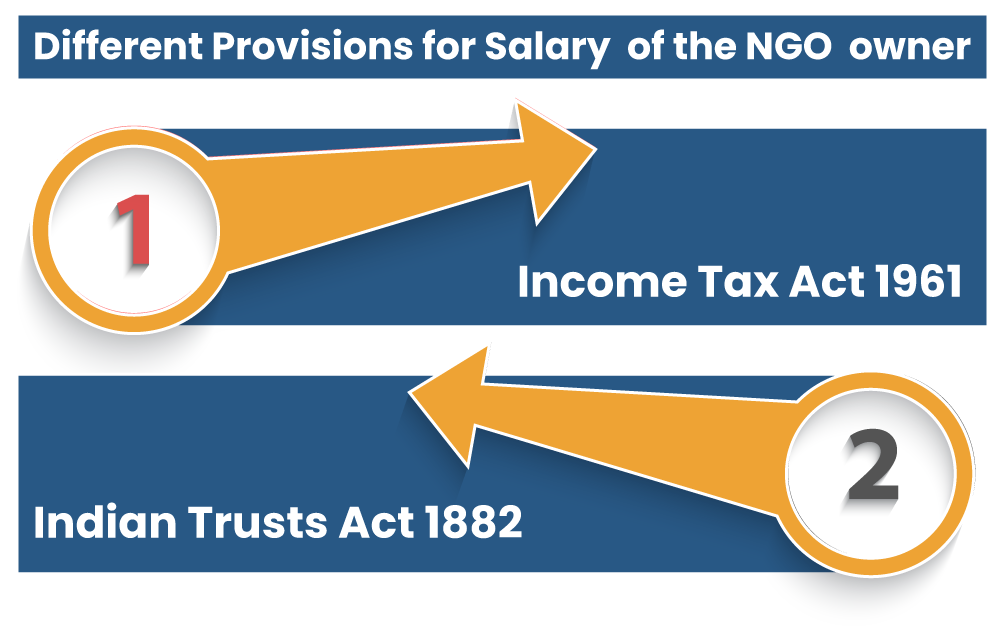These days there are several NGOs thriving throughout the nation. In today’s pandemic hit world, the NGOs are playing a key role in providing financial and other aids required for subsistence of the poverty-ridden people. However, one of the most frequently asked questions asked by the entities who wish to setup an NGO is – “Can a Founder of an NGO Draw Salary from the Trust?”
Managing a public charitable trust is not at all an easy task. It requires a group of several trustees to invest considerable amount of time and effort. Hence, there are many NGO owners who think that they must receive some compensation from their Trust Fund in lieu of the efforts they put into the Trust. Most of the experienced professionals from the CA, CS and Legal fraternity would straightway advise that a trustee is not permitted to retrieve any pecuniary benefits, whether by the way of trustee salary, trustee remuneration or any other form of trustee compensation, from the Trust account. However, the truth is slightly different. A trustee or an NGO owner may be entitled to a salary or remuneration. This purely depends upon what constitutes gains of the NGO in question.
Whether Founder of an NGO can draw salary from the trust?
First of all we must comprehend that the owner of an NGO may also be its trustee. Being a founder or the trustee of a trust (NGO), a person may draw a reasonable salary. There are many entrepreneurs working for social welfare through NGOs, and are totally vague about whether they have a right to draw a salary from the trust. Mostly, the experts have very inadequate knowledge about this aspect of the NGOs. Most of them advise that if the intent is for the public interest, then you can’t take benefit from an NGO.
However, here it is important to note that salary is not a kind of “benefit”, rather it is remuneration. It comes under the category of expenses. Salary is paid for the dedication and/or the expertise that a trustee is providing for the noble public cause. Now, if a trustee would have worked with any other organization, the same would have raised even more income for him. Hence, for someone to be able to give his contribution towards a social reform or noble service on a full-time basis salary is indispensable. For instance, the Prime Minister of India is a kind of a social worker, and he receives a salary for his work. However, the PM does not take any benefit from a government-run scheme.
In this context, the word “Reasonable” refers to the fact that the compensation must not be higher than the existing average market standards. In this way, such an ideal compensation should actually be a nick below the average, given that if the intent is a noble service to mankind, i.e. charitable work and it’s better to put the least possible load on the Trust Funds.
Read our article:How to approach NGO Registration in India? Forms & Features
In case one or more trustees are trying to get irrational benefits from the Trust Fund, there are provisions under the Income Tax Act to restrict or revoke the allowances of tax exemptions under section 12A and 80G. In such a case, all the donations and earnings obtained by the Trust shall become taxable.
The concept of salary of a trustee or NGO owner is explained rationally under the Income Tax 1961 as well as the Indian Trusts Act 1882. Let us understand them in detail.


Provisions of the Indian Trusts Act 1882
The Section 50 of the Indian Trusts Act 1882 states—
- In the absence of clear provisions to the contrary mentioned in the instrument of a trust or of the contract to the contrary entered into with the beneficiary or the Court at the time of forming the trust, the trustee or the NGO Owner does not possess the right to get remuneration for his effort, skill and the loss of time in running that trust.
- Nothing under this section shall apply to the Official Trustee, Administrator General, Public Curator, or person holding a certificate of administration.
On the contrary, the Section 95 (a) of the Indian Trusts Act 1882 states—
- Provided that where he rightfully uses the property or utilizes it in his trade or his business, he shall be entitled to a reasonable remuneration for his trouble, skill and loss of time in such cultivation or employment.
With this, we can clearly understand the possibility of an NGO owner drawing salary from the trust.
The Provisions of Income Tax Act 1961
As per the section 13(2) of the Income Tax Act 1961 –
- Any income or the gain of a trust or NGO in question or any part of such an income or property shall, for the intent of that clause, be deemed to have been utilized or applied for the benefit of a person referred to (3).
- In case any amount is paid by way of a salary, an allowance or any form otherwise during the preceding year to any individual referred to in the section 13(3), out of the assets of the trust or NGO for services provided by that person to such a trust or the NGO and the amount so paid is in excess of what may be reasonably paid for such services;
Here the subsection 13(3) of Income Tax Act 1961 enlists the persons eligible to draw the salary from the NGO –
Subsection 13(3) of Income Tax Act 1961
Those individuals referred to in clause (c) of sub-section (1) and sub-section (2) are the following, are listed below —
- An author of the trust, also called the founder of the institution;
- Any other person who has made a substantial contribution to the trust or institution, that means, any individual whose total contribution up to the end of the relevant previous year exceeds INR 50,000;
- Wherever such an author, founder or person is a Hindu undivided family, a member of his family;
- Any of the trustees of the trust or manager (by whatever name called) of the NGO;
- Any relative of such an author, the NGO founder, person, member, trustee or manager as aforesaid;
- Any other concern in which any of the persons referred to in above points i, ii, iii and iv has a substantial (considerable) interest in the NGO.
From the above we can perceive, that as per the provisions of the Income Tax Act 1961[1], a trustee or the owner of the NGO has right to draw his salary under the circumstances discussed above.
Read our article:An Outlook: Registering an NGO in India











